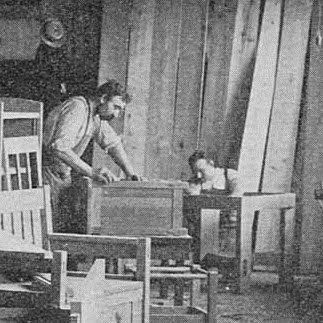Josef Amandus Wittkowski
Item
Title
Josef Amandus Wittkowski
Date
ca. November 1868 to November 12, 1942
Description
Wittkoski was born in Germany in November 1868 and emigrated the United States in 1891. He apparently had trained as a blacksmith in Germany, as by 1891 he had listed himself in the Syracuse city directory as one. Throughout the 1890s he continued to list himself as such, sometimes going by the name “Joseph A.” and other times using “Amandus.” By 1910—at which point he was working for Stickley—he had foregone the limiting term “blacksmith” for the more inclusive “metalworker,” a designation that appeared in the Syracuse city directories as early as 1906.
Wittkoski, who was the highest paid employee of the metal shop during the construction of the Log House at Craftsman Farms, began working for Stickley as early as February 1909. He was amongst the highest-paid craftsmen in the metal shop and started at three dollars per day, making him only one of two employees to earn this much. By October 1909 he was earning to $19.50 per week and by May of the following year $21.00 per week. His value as an employee is reflected not only in his salary, but the consistency with which he was employed. Despite the seasonal fluctuations that swelled and diminished the payroll of the Metal Shop, Wittkowski was continuously employed.
Wittkowski appears to have left Stickley’s employment in July 1912, but continued to work as blacksmith and live in Syracuse, according to the 1915 New York State Census. By 1920 he was living in Buffalo, and working for the automobile industry. In 1925, he was working as a coppersmith in East Aurora, New York. With his previous involvement in the Arts and Crafts at Stickley’s metal shop and his employment as a coppersmith in East Aurora, it is certainly possible he worked for the Roycrofters, though no documentation has been uncovered. Perhaps significantly, though, Wittkowski and his wife lived less than one-half of a mile from the copper shop. Little is known of his work through the 1930s, but he remained in East Aurora until 1940 where he lived with his daughter’s family following the death of his wife. Wittkowski died on November 12, 1942.
Wittkoski, who was the highest paid employee of the metal shop during the construction of the Log House at Craftsman Farms, began working for Stickley as early as February 1909. He was amongst the highest-paid craftsmen in the metal shop and started at three dollars per day, making him only one of two employees to earn this much. By October 1909 he was earning to $19.50 per week and by May of the following year $21.00 per week. His value as an employee is reflected not only in his salary, but the consistency with which he was employed. Despite the seasonal fluctuations that swelled and diminished the payroll of the Metal Shop, Wittkowski was continuously employed.
Wittkowski appears to have left Stickley’s employment in July 1912, but continued to work as blacksmith and live in Syracuse, according to the 1915 New York State Census. By 1920 he was living in Buffalo, and working for the automobile industry. In 1925, he was working as a coppersmith in East Aurora, New York. With his previous involvement in the Arts and Crafts at Stickley’s metal shop and his employment as a coppersmith in East Aurora, it is certainly possible he worked for the Roycrofters, though no documentation has been uncovered. Perhaps significantly, though, Wittkowski and his wife lived less than one-half of a mile from the copper shop. Little is known of his work through the 1930s, but he remained in East Aurora until 1940 where he lived with his daughter’s family following the death of his wife. Wittkowski died on November 12, 1942.

